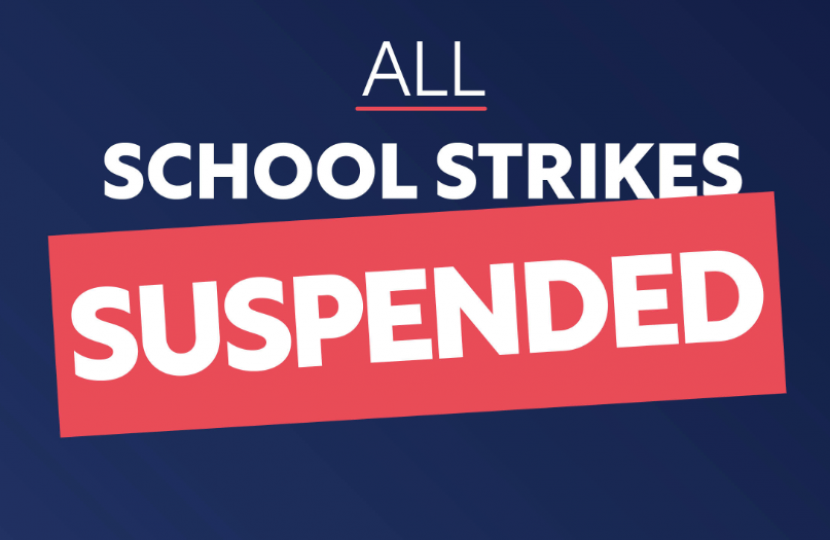
We must do everything we can to meet the Prime Minister’s pledge to halve inflation. That means making responsible decisions, even if they are difficult. If not, we risk making inflation worse.
The Conservatives are rightly proud of our world-class public servants and that is why the Government is today delivering one of the highest pay settlements in more than two decades, recognising the extraordinary cost of living pressures.
But we cannot live beyond our means and stoke inflation. It would be neither fair nor affordable to meet unsustainable demands for pay rises well into the double digits.
So the Government will stick to their word on public sector pay and the pay review bodies. But they must also stay the course with their fiscal plan, providing a fair deal that follows the recommendations of the independent pay review bodies, but that involves no new spending and no new borrowing.
That requires difficult decisions and they will not shy away from that. More borrowing would simply add more pressure on inflation at exactly the wrong time, risking higher interest rates and higher mortgage rates. That is exactly what the Labour Party would do – with their £28 billion a year borrowing plan which would leave us all poorer.
The awards represent one of the highest settlements in more than two decades and put more money in the pockets of hard-working public servants at a difficult time:
-
Teachers
- This deal delivers the biggest pay increase for teachers in 30 years.
- This will see the typical teacher take home almost £44,300 a year, with a pay increase of more than £2,700.
- Around 40 per cent of teachers’ pay will rise by between 10 and 17.4 per cent.
-
NHS Staff
- First year Junior Doctors basic pay will rise by 10.3 per cent - or over £3,000.
- The lowest paid GPs will see an increase of £3,900 or 6 per cent.
- Consultants will see an average increase of around £6,300.
- Our previously agreed deal with NHS staff delivered a 5 per cent pay rise along with one-off awards worth more than £3,600 for the typical nurse or ambulance worker.
-
Police
- A typical police officer (constables) will see an increase of nearly £5,000.
- A typical police officer (constables) will see an increase of nearly £5,000.
-
Armed forces
- A £2,000 increase with around a 10 per cent rise for the lowest paid personnel - £3,000+ on average.
- A £2,000 increase with around a 10 per cent rise for the lowest paid personnel - £3,000+ on average.
-
Prison officers
- Increases of £1,600-£5,000, with a 10 per cent uplift for the lowest paid.
- Increases of £1,600-£5,000, with a 10 per cent uplift for the lowest paid.
Today's news provides public sector workers with a deal in line with the private sector. The latest median pay settlements across the economy were 6 per cent. This award will see public sector workers get a consolidated wage increase of at least 6 per cent.
Why not borrow to pay for it?
It is vital that the Government delivers this in a way that is fair to the taxpayer and does not stoke inflation:
- The Government's plan is fair to the taxpayer and will not fuel inflation with no new borrowing or spending to fund these awards. More borrowing would simply add more pressure on inflation at exactly the wrong time, risking higher interest rates and higher mortgage rates.
- .The Bank of England has been clear that we cannot continue with a cycle of unsustainable pay awards.
- The IMF has been clear that bringing down inflation should be a priority and has urged the Government to stay the course with their fiscal plan. The Government is clear that their fiscal policy will support the Bank of England in getting inflation down - the Government's commitment to return inflation to the 2 per cent target remains ironclad. And they will continue to get debt down by not borrowing for these awards.
- They have to set the right example as one of the country’s largest employers. More borrowing and more demand would just add to pressure on inflation and interest rates at exactly the wrong time, making the Bank of England’s job harder. And given the spending involved in public sector pay, the Government has to be responsible.
- They have made these decisions whilst protecting frontline services. They will be spending £2 billion more this year and £3 billion more next year on pay for these public sector workers than they had planned.
How is it being funded?
As responsible Conservative government’s do, they are taking the tough decisions to protect taxpayers money:
- These recommendations do cost money – they will be spending £2 billion more this year and £3 billion more next year on pay for these public sector workers than they had planned. That requires difficult decisions to make sure they stick with their fiscal plan.
- As a result they have had to take tough but responsible decisions to ensure no new spending and no new borrowing:
- Delivering efficiencies and savings within Whitehall departments. This includes working with police forces to drive further efficiencies and protecting frontline police officer numbers, and prioritising spending on programmes and core Home Office spending to provide police forces with additional grants to reduce the scale of the pressure. This is alongside our ongoing Productivity Review.
- Increasing visa fees across a range of routes. This includes raising the costs of a variety of visas across the system.
- Increasing the immigration health surcharge. Subject to legislation passing, the main rate will increase to £1,035, and the discounted rate for students and under-18s will increase to £776.
- The Government have made these decisions whilst protecting frontline services. They will be spending £2 billion more this year and £3 billion more next year on pay for these public sector workers than they had planned.
- This will not mean reductions in frontline services. Schools will receive the full costs of the pay rise in new funding, above the 3.5 per cent they are already funded for. Any reprioritisation decisions will not impact core schools funding. Frontline health services won't be impacted by any reprioritisation decisions within DHSC - pressures will be covered by wider savings and efficiencies and the increase in the immigration health surcharge.
- These savings are fully costed. The Government has agreed a plan with each department on how awards will be funded from within existing budgets.
Labour can't be trusted with the economy
- Labour have made £90 billion of unfunded spending commitments costing each household over £3,000. Labour have racked up over £90 billion of spending commitments. Taken with the 27 million households across the UK this is a cost of over £3,000 per household.
- Labour have a £28 billion a year plan for borrowing meaning which would fuel inflation and interest rates. Rachel Reeves has said Labour would borrow £28 billion a year until 2030 on tackling climate change – Reeves said it would make her ‘the first green chancellor’, which the Shadow Chief Secretary to the Treasury called a ‘borrowing plan’.
- The IFS have said that Labour’s £28 billion borrowing plan would cause interest rates and inflation to rise. Paul Johnson said: ‘It is much harder to argue you could do significant additional borrowing because additional borrowing both pumps more money into the economy, potentially increasing inflation, and also drives up interest rates’.


